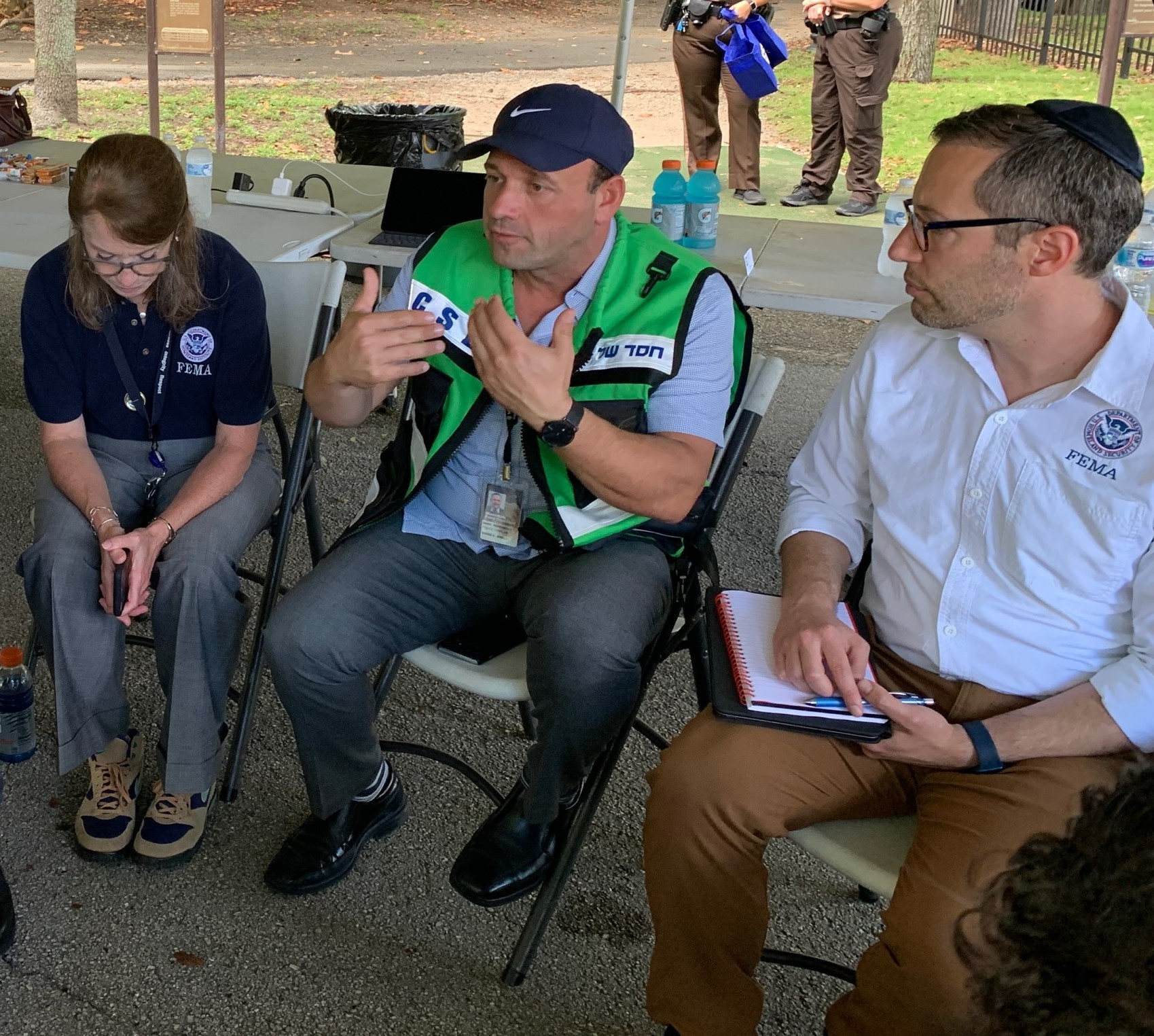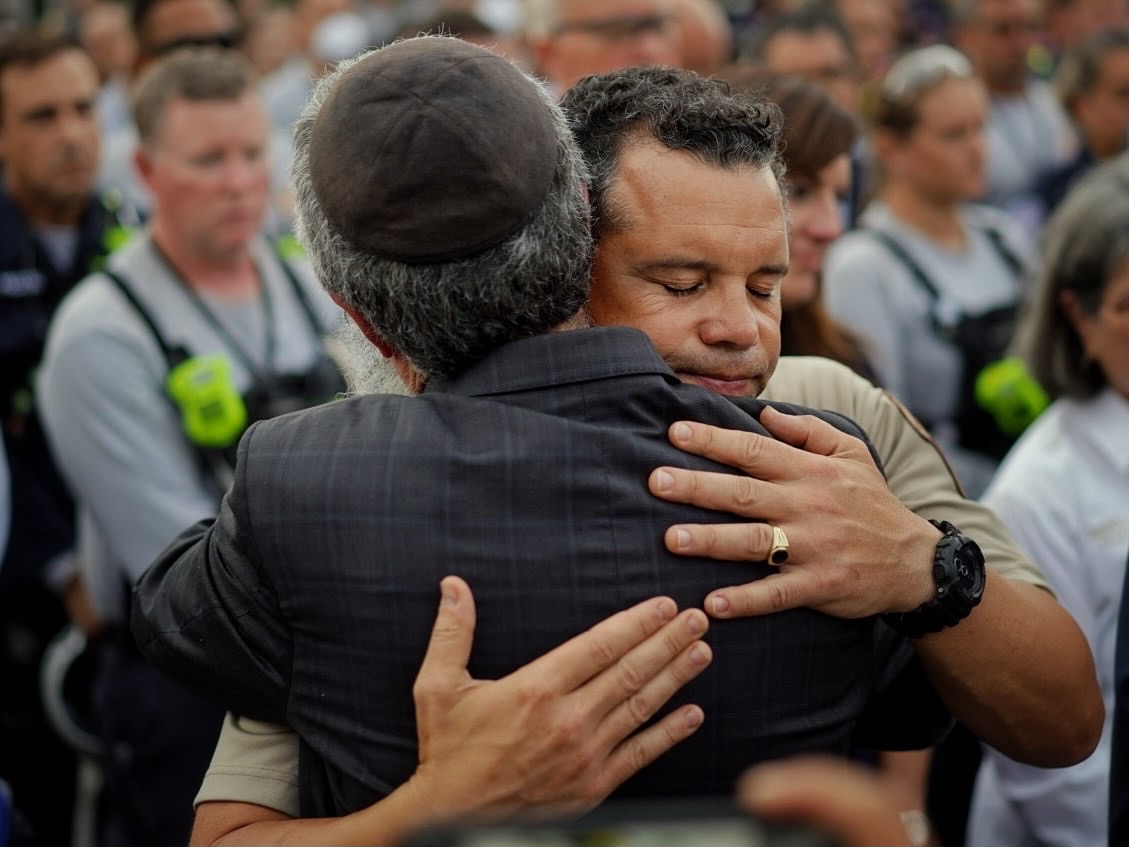Senior Advisor for the Office of Response and Recovery Mike Plostock shares his experience responding after the Surfside Collapse.
June 25, 2021.
I was on Long Island to celebrate my niece’s bat mitzvah, when I heard about a building collapse in Surfside, Florida. At the time, I didn’t realize that 48 hours later, I would be on the ground there supporting the FEMA team and the families impacted by the devastating collapse that ultimately took nearly 100 lives. Given the sizable, observant Jewish community in Surfside, and the anticipated loss of life, I was asked to deploy to share information about the customs and rituals of the Jewish community. My job was to better position the FEMA team to adhere to Jewish cultural traditions as the families were experiencing this traumatic event.

Senior Advisor for the Office of Response and Recovery Mike Plostock (far right) responds after the building collapse in Surfside, Florida.
I’ve worked for FEMA for 5 years, and while I had never been deployed to the field, I’d been to many disaster sites. As I flew down to Miami, I knew this would be different. It was going to be more personal. The Jewish community is small, and within 24 hours of arriving, I already knew three people missing by one degree of separation.
One of the things I love about the FEMA team is how we always try to meet people where they are, to be culturally appropriate, and sensitive to the communities we serve. When I first arrived onsite, I met with two other members of the FEMA team who were brought down for similar reasons. We put together information that we thought would be helpful for our team as they engaged with families through this unimaginable event and the days and weeks that followed.
My deployment was only supposed to last a few days, but I was asked to stay in Surfside to work with local groups to obtain Kosher meals and support the work happening in the Family Assistance Center. Ultimately, I was on the ground supporting families and the community for nearly six weeks.
While in the Family Assistance Center, I met with families who were waiting on word about their loved ones. While I come from a relatively religious family, I don’t normally wear a yarmulke, but while I was down in Surfside, I did. I wore the yarmulke for two reasons. First, faith was one of the things that was needed by everyone in Surfside from first responders, to search and rescue teams, to the families. Second, wearing a yarmulke immediately broke down barriers. When the families saw me wearing a yarmulke, they knew we shared a common bond and that I might understand their pain differently. I remember one family asked me to put on tefillin to pray for their loved one and the family.[i] Subsequently, after their loved one was found, they asked me to sit shiva [ii] with them, which was an honor.
Responding to Surfside changed me. It was the most difficult and the most rewarding experience I have had in my professional life. The FEMA team who responded to Surfside are some of the most compassionate, dedicated professionals I have ever worked with. Regional Administrator Gracia Szczech and FCO Tom McCool joined others like Deputy Associate Administrator Dave Bibo as my North Stars of FEMA, demonstrating to me how best to help those we serve. They showed me the importance of executing our mission with our core values in mind. We at FEMA are provided a unique opportunity to change the lives and experiences of people during their darkest days. I encourage you to take every opportunity to get into the field to see our mission in real time. I guarantee it will change you too.
While last June was not the joyous experience I expected when I gathered with my family for my niece’s bat mitzvah, it turned out to be a meaningful experience that strengthened my connection with the Jewish community and deepened my commitment to FEMA’s mission to serve all communities.
[i] A pair of black leather boxes containing Hebrew parchment scrolls. A set includes two—one for the head and one for the arm. Each consists of three main components: the scrolls, the box and the strap. (source: Chabad.org)
[ii] The practice that symbolizes the mourner being “brought low” following the loss of a loved one. (source: shive.com)

Two men embrace during a moment of silence in July 2021.


